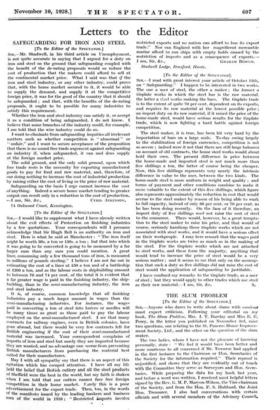[To the Editor of the SPECTATOR.] would like to supplement
what I have already written about the evil effects of Protection on finishing industries by a few quotations. Your correspondents will I presume acknowledge, that Sir Hugh Bell is an authority on iron and steel. Here is what he said at Manchester : " The iron itself might be worth 30s. a ton or 130s. a ton ; but that into which it was going to be converted is going to be measured by a far larger sum than any sum you could mention. A great liner, consuming only a few thousand tons of iron, is measured in millions of pounds sterling." I believe I am not far out in estimating the cost of a liner at 250 a ton and of a battleship at 1200 a ton, and as the labour costs in shipbuilding amount to between 70 and 74 per cent, of the total it is evident that a far greater wage is paid in the finishing industry, the ship- building, than in the semi-manufacturing industry, the iron and steel industry.
It is, of course, common knowledge that all finishing • industries pay a much larger amount in wages than the semi-manufacturing industries. For instance, the wages paid in converting a ton of steel into knives or needles will be many times as great as those paid to pay the labour employed on the semi-manufactured steel. I see that many contracts for railway engines, even in British colonies, have gone abroad, but there would be very few contracts left for British engineering if the cost of their semi‘manufactured material was increa.sed. Your correspondent complains of imports of iron and steel but surely they are imported because they are wanted, and no advantage can iccrue from preventing British manufacturers from purchasing the material best suited for their manufactures.
May I with all sympathy say that there is an aspect of this agitation which has escaped attention. I have all my life
held the belief that British cutlery and all the steel products of Sheffield were the best in the world, but my faith is shaken When I -am told that our cutlers cannot face free foreign competition in their home market. S arely this is a poor advertisement for the ekport trade. Then, too, in the *Fords of the manifesto issued by the leading bankers' and business men of the world in 1926 "Restricted imports involve
restricted exports and no nation can afford to lose its export trade." Nor can England with her magnificent mercantile marine afford to run ships with empty holds caused by the restriction of imports and as a consequence of exports.—












































 Previous page
Previous page